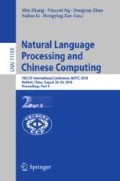Abstract
Multi-task learning (MTL) models, which pool examples arisen out of several tasks, have achieved remarkable results in language processing. However, multi-task learning is not always effective when compared with the single-task methods in sequence tagging. One possible reason is that existing methods to multi-task sequence tagging often reply on lower layer parameter sharing to connect different tasks. The lack of interactions between different tasks results in limited performance improvement. In this paper, we propose a novel multi-task learning architecture which could iteratively utilize the prediction results of each task explicitly. We train our model for part-of-speech (POS) tagging, chunking and named entity recognition (NER) tasks simultaneously. Experimental results show that without any task-specific features, our model obtains the state-of-the-art performance on both chunking and NER.
Access this chapter
Tax calculation will be finalised at checkout
Purchases are for personal use only
References
Ma, X., Hovy, E.H.: End-to-end sequence labeling via bi-directional LSTM-CNNs-CRF. In: ACL, pp. 1064–1074 (2016)
dos Santos, C.N., Zadrozny, B.: Learning character-level representations for part-of-speech tagging. In: ICML, pp. 1818–1826 (2014)
Huang, Z., Xu, W., Yu, K.: Bidirectional LSTM-CRF models for sequence tagging. CoRR, abs/1508.01991 (2015)
Collobert, R., et al.: Natural language processing (almost) from scratch. JMLR 12, 2493–2537 (2011)
Lample, G., Ballesteros, M., Subramanian, S., Kawakami, K., Dyer, C.: Neural architectures for named entity recognition. In: NAACL, pp. 260–270 (2016)
Chiu, J.P.C., Nichols, E.: Named entity recognition with bidirectional LSTM-CNNS. TACL 4, 357–370 (2016)
Caruana, R.: Multitask learning. Mach. Learn. 28(1), 41–75 (1997)
Cheng, H., Fang, H., Ostendorf, M.: Open-domain name error detection using a multi-task RNN. In: EMNLP, pp. 737–746 (2015)
Søgaard, A., Goldberg, Y.: Deep multi-task learning with low level tasks supervised at lower layers. In: ACL(2), pp. 231–235 (2016)
Alonso, H.M., Plank, B.: When is multitask learning effective? Semantic sequence predictionunder varying data conditions. In: EACL, pp. 44–53 (2017)
Kim, Y., Jernite, Y., Sontag, D., Rush, A.M.: Character-aware neural language models. In: AAAI, pp. 2741–2749 (2016)
Srivastava, R.K., Greff, K., Schmidhuber, J.: Training very deep networks. In: NIPS, pp. 2377–2385 (2015)
Hochreiter, S., Schmidhuber, J.: Long short-term memory. Neural Comput. 9(8), 1735–1780 (1997)
Ling, W., Dyer, C., Black, A.W., Trancoso, I., Fermandez, R., Amir, S., Marujo, L., Luís, T.: Finding function in form: compositional character models for open vocabulary word representation. In: EMNLP, pp. 1520–1530 (2015)
Kudoh, T., Matsumoto, Y.: Use of support vector learning for chunk identification. In: CoNLL, pp. 142–144 (2000)
Shen, H., Sarkar, A.: Voting between multiple data representations for text chunking. In: Kégl, B., Lapalme, G. (eds.) AI 2005. LNCS (LNAI), vol. 3501, pp. 389–400. Springer, Heidelberg (2005). https://doi.org/10.1007/11424918_40
Luo, G., Huang, X., Lin, C.-Y., Nie, Z.: Joint entity recognition and disambiguation. In: EMNLP, pp. 879–888 (2015)
Plank, B., Søgaard, A., Goldberg, Y.: Multilingual part-of-speech tagging with bidirectional long short-term memory models and auxiliary loss. In: ACL(2), pp. 412–418 (2016)
Durrett, G., Klein, D.: A joint model for entity analysis: coreference, typing, and linking. TACL 2, 477–490 (2014)
Acknowledgement
This work was supported by the National Natural Science Foundation of China U1636103, 61632011, Shenzhen Foundational Research Funding 20170307150024907, Key Technologies Research and Development Program of Shenzhen JSGG20170817140856618.
Author information
Authors and Affiliations
Corresponding author
Editor information
Editors and Affiliations
Rights and permissions
Copyright information
© 2018 Springer Nature Switzerland AG
About this paper
Cite this paper
Gui, L., Du, J., Zhao, Z., He, Y., Xu, R., Fan, C. (2018). An End-to-End Scalable Iterative Sequence Tagging with Multi-Task Learning. In: Zhang, M., Ng, V., Zhao, D., Li, S., Zan, H. (eds) Natural Language Processing and Chinese Computing. NLPCC 2018. Lecture Notes in Computer Science(), vol 11109. Springer, Cham. https://doi.org/10.1007/978-3-319-99501-4_25
Download citation
DOI: https://doi.org/10.1007/978-3-319-99501-4_25
Published:
Publisher Name: Springer, Cham
Print ISBN: 978-3-319-99500-7
Online ISBN: 978-3-319-99501-4
eBook Packages: Computer ScienceComputer Science (R0)


